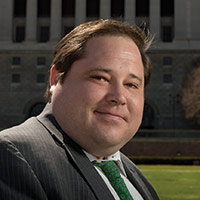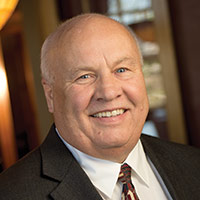The pros of pro bono
By: Erika Strebel, [email protected]//May 11, 2016//
Volunteer work takes attorneys down different paths
Wisconsin Supreme Court Rules require all lawyers in the state to provide legal services voluntarily to those who cannot afford them in order to expand access to justice. But, often, that work comes full circle, offering attorneys opportunities to advance their careers while expanding personal development. For example, pro bono work can give attorneys a chance to explore unfamiliar areas of law, network with other attorneys and gain new skill. Here are the stories of three attorneys and how pro bono work took them on different paths in their careers and personal lives.
EXPLORING OPTIONS

The deck looked stacked against Eamon Guerin from the start. He had got his law degree in the wake of the 2008 recession, a time when the legal industry was shedding rather than adding jobs.
When Guerin was eventually able to snag a position in the city of Milwaukee’s grant administration department, it wasn’t even close to the legal field.
But thanks to the volunteer legal work he took on in addition to his job with the city, the second trial in his career was before a federal jury.
Pro bono work has taken Guerin down some unlikely paths.
He had started volunteering with Legal Action of Wisconsin, the Milwaukee Volunteer Legal Clinic and the Eastern District of Wisconsin Bar Association pro se hotline.
“The biggest problem I had out of law school was, well, you got no experience, so what good are you?” he said. “And the truth is, coming out of law school you don’t have experience in terms of the procedural understanding, where to file, what to file, and enrolling in those types of programs allowed me to — with minimal commitment — to represent those people who really had nowhere else to turn. As a result I was able to explore a variety of areas of law that I didn’t know existed.”
That work helped him develop an idea of what he liked to do, which turned out to be trial litigation.
“I love being in a courtroom,” Guerin said. “Some people find out that they never want to be a in a courtroom and transactional work is what they want to do, and the world needs transactional lawyers too.”
He said pro bono work also gave him real-world experience that comes in handy now that he has his own practice. He was able to use that time, for instance, to become better at communicating with clients. Working pro bono also helped him find ways to identify which legal considerations were most relevant to a particular case.
“Client skills, in the world of solo practitioners, is very important,” he said. “You have to be a people person because not everyone is easy to deal with.”
A TASTE OF THE OTHER SIDE

For Greg Cook, pro bono work eventually led him to the field of law that fit him best.
In the 1990s, Cook was a successful insurance-defense attorney and partner at a Milwaukee firm.
“It was not hard to be really successful as a good defense attorney because you’ve got pretty much everything in your corner. It’s a fairly conservative state,” he said. “You’re not necessarily going to lose a case or get hurt really badly on a case.”
But then, over the years, he got a taste of plaintiff’s work. There was the time, for instance, when Cook took on some pro bono cases fighting drugs and crime in Milwaukee by suing landlords over nuisance violations. That work earned him the
State Bar of Wisconsin’s Donald O’Melia Award for Public Service in 1993.
The pro bono experience came as part of the many cases that gave him a chance to do plaintiff’s work. He liked that field of practice enough that he decided, in 2006, to make it his speciality.
“I enjoyed being on the plaintiff’s side for some reason,” Cook said. “I just felt more fulfilled when I was representing people who had real interest and were individuals. And they were more appreciative. When you’re representing big companies, insurance companies, you’re usually reporting to a claims manager or a loss manager. And, over time, they just expected you to win. And if you lost and a case got away from you, they were angry. They were mad about it.”
Even then, he said, he knew insurance defense was not his calling. The nuisance cases that came his way, then, were in many ways a godsend. They let him stay afloat when he was starting to wonder whether he had chosen the right career.
All the while, his partners were pressuring him to stop doing pro bono work, he said. But he persisted.
“There was sort of a soul-sucking feeling that I had,” Cook said. “I just felt like I was losing my mortal soul. It just felt like everything was getting sucked out. What was I really doing in life? And so, I found that this work gave it meaning, and it made me feel like hey, you’re a lawyer. You’re not just defending the gates and preventing money from going out the door. ”
PRO BONO CLOSE TO HOME
Pro bono work has brought retired trial lawyer Doug Klingberg closer to home — both figuratively and literally.
Klingberg practiced law for 42 years as a trial attorney, primarily taking on cases involving medical malpractice and product liability, as well as some commercial litigation.
“I was fortunate to be very busy,” he said. “I had a practice I really enjoyed, and that practice kept me really busy. I didn’t have the time to do the kinds of things I am doing now.”
Klingberg spent most of his time flying coast to coast for cases. But pro bono work was always in the back of his mind.
“I’ve always been a counselor of sorts,” he said. “When people have problems, I try to help with them.”
Once he retired in 2012, Klingberg called on Judicare, a nonprofit law firm that primarily represents those who cannot afford representation.
Since starting to man the phone lines at Judicare, Klingberg has talked with nearly 450 people who are seeking legal help. Most of his time is spent providing advice on landlord and tenant law. He’ll go to a hearing on occasion but generally avoids taking on cases.
So, instead of traveling for work, he travels — with his wife — to see his grandchildren. Klingberg said he is grateful that he has been able to find meaningful ways to spend his time.
“If you are a recent retiree and getting bored with things, there’s always a way to make a positive contribution and you can feel good about it and make a difference for someone who needs it,” he said.
Legal News
- Wisconsin joins Feds, dozens of states to hold airlines accountable for bad behavior
- Trump ahead of Biden in new Marquette poll
- Bankruptcy court approves Milwaukee Marriott Downtown ‘business as usual’ motion
- New Crime Gun Intelligence Center to launch in Chicago
- Arrest warrant issued for Minocqua Brewing owner who filed Lawsuit against Town of Minocqua
- Wisconsin Supreme Court justices question how much power Legislature should have
- Reinhart named the 2024 Wisconsin law firm of the year by benchmark litigation
- Milwaukee’s Common Council now has the most African Americans, women and openly LGBTQ members ever
- Office of School Safety Provides Behavioral and Threat Assessment Management Training Ahead of 25th Anniversary of Columbine Shooting
- Wisconsin Supreme Court to hear arguments in Democratic governor’s suit against GOP-led Legislature
- Lawsuit asks Wisconsin Supreme Court to strike down governor’s 400-year veto
- Wisconsin man pleads not guilty to neglect in disappearance of boy
WLJ People
- Power 30 Personal Injury Attorneys – Russell Nicolet
- Power 30 Personal Injury Attorneys – Benjamin Nicolet
- Power 30 Personal Injury Attorneys – Dustin T. Woehl
- Power 30 Personal Injury Attorneys – Katherine Metzger
- Power 30 Personal Injury Attorneys – Joseph Ryan
- Power 30 Personal Injury Attorneys – James M. Ryan
- Power 30 Personal Injury Attorneys – Dana Wachs
- Power 30 Personal Injury Attorneys – Mark L. Thomsen
- Power 30 Personal Injury Attorneys – Matthew Lein
- Power 30 Personal Injury Attorneys – Jeffrey A. Pitman
- Power 30 Personal Injury Attorneys – William Pemberton
- Power 30 Personal Injury Attorneys – Howard S. Sicula











